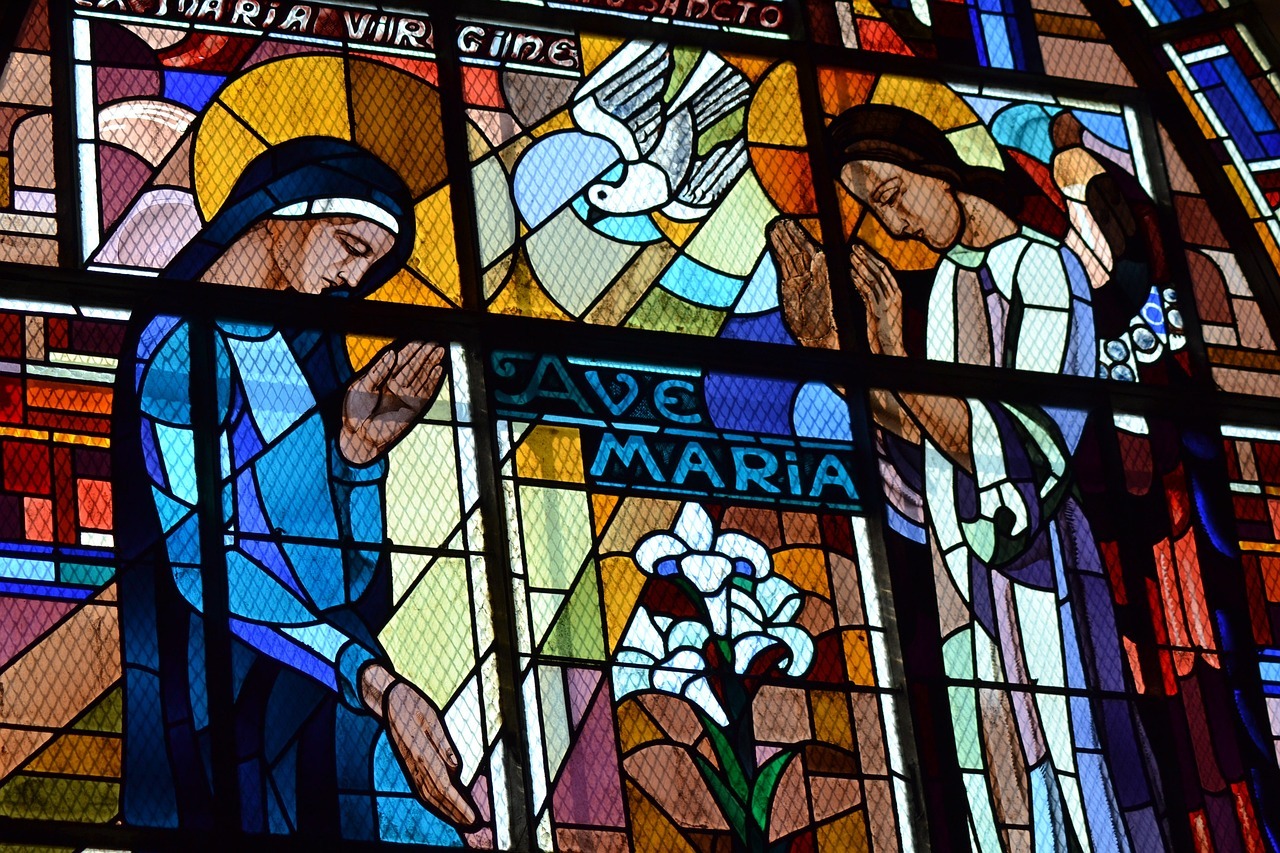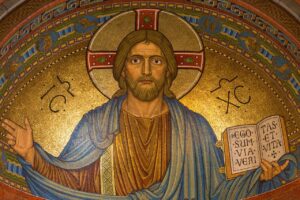2 Samuel 7: 1-5, 8b-12, 14a, 16 (RM) or 1-11, 16 (RCL); Psalm 89 or Luke 1: 47-55; Romans 16: 25-27; Luke 1: 26-38.
A few years ago I was in the city of Nuremberg, Germany, visiting the elderly sister of the pastor of my church in Ottawa who had died several months before. She generously swept me up on a two-day walking tour all around the city. At one point we stopped at a church off the main square and she said, “Here’s a wonderful 15th-century wood carving you have to see.”
It was hanging from the ceiling, literally, and it depicted the angel Gabriel’s Annunciation to Mary. Mary is absolutely astonished, and totally in shock – her mouth is agape, and she drops the book from her hand! Never mind that it was a medieval little bound book, and never mind that a village girl in ancient Palestine would almost certainly have been illiterate. This concrete detail was very funny and just delightful!
Our Gospel reading for today marks the beginning of the salvation story, the story of how Christ became one of us, incarnate in our flesh and living among us on this earth. It means the waiting of Advent is over. We know that God is among us, not merely over us or somewhere outside us. Yet, in some ways it’s a quirky story.
Now, to give an account of the annunciation Luke used a conventional story line with elements that would have been familiar to his early Christian audience. First, Luke sets the stage by telling the story of Elizabeth, Mary’s relative who became pregnant for the first time in old age, and her husband Zacharias. Then Gabriel appears to an unsuspecting teenage girl in a rural backwater of Galilee, using language that Luke’s audience would have recognized from their scriptures: “Hail, favored one, the Lord is with you” would sound familiar from God’s promises of salvation to his people. Mary is startled at first, which is no different from the ancient heroes to whom God had appeared: Moses and the burning bush, Noah with the impending flood, Abraham, Samuel, Samson and so forth.
When Mary reacts with puzzlement, the angel tells her that “The power of the Most High will overshadow you,” an image that recalls the cloud that guided the Hebrew people through the desert after they had escaped from slavery in Egypt.
And the angel concludes his message by saying, “Nothing is impossible with God,” echoing the words of God to Abraham in announcing to him the birth of his son Isaac, when Sarah was already old.
So all these trigger-words tell how the birth of Christ fits with the ways God was present and bringing salvation to the people in ancient times. What’s odd about it? Mary talks back. She asks pertinent questions. Imagine you’re a young girl, raised in a culture of female submission, and this unearthly visitor turns up with a stunning message – and you pose a question, “How can this be? I’ve never been with a man.” Mary actually debates with the angel, trying to make his message make sense when it doesn’t, not at first glance. But Gabriel doesn’t brush her off, he explains simply, that the child will be of God. And then, in the face of this not-normal, un-natural explanation, Mary says Yes.
When I was teaching theology I used to ask the class,
“Did Mary have free will? In other words, could she have said No to God? If she couldn’t, then her Yes doesn’t have much credibility and she’s like a passive victim.”
The students had to stop and think. If you believe that Mary was predestined to become the mother of Jesus, then she really didn’t have any choice.
But this girl, this almost-nobody in her culture, said a binding, definitive Yes. She morphed from peasant girl to prophet, from Mary to the mother of Jesus the Christ, from a simple life to one of discipleship. This discipleship was going to cost her. She did indeed have a great deal to ponder over.
The annunciation does put the young Mary in the position of a prophet, an agent of God’s abiding presence with his people. Mary is a person whose very body, not just her words, proclaims “My soul rejoices in God… who has done mighty things…” And God will do even more to make justice for the poor and lowly, and bring down the mighty who exploit the poor. This is not just a radical change in one person, but a sign and a promise of healing and transformation in our whole, often ugly, violent, war-torn, terrorism-plagued world. Mary, a prophet of hope.
If Mary can live this message, so can we. What we celebrate once a year, we can live, with new vitality and passionate conviction, every day.
© Susan K. Roll
Susan Roll retired from the Faculty of Theology at Saint Paul University, Ottawa, in 2018, where she served as Director of the Sophia Research Centre. Her research and publications are centred in the fields of liturgy, sacraments, and feminist theology. She holds a Ph.D. from the Catholic University of Leuven (Louvain), Belgium, and has been involved with international academic societies in liturgy and theology, as well as university chaplaincy, Indigenous ministry and church reform projects.





The lines from your reflection that continue to echo in me are: “(Mary) morphed from peasant girl to prophet, from Mary to the mother of Jesus the Christ, from a simple life to one of discipleship. This discipleship was going to cost her. She did indeed have a great deal to ponder over.”
Mary as Prophet, is an understanding that inspires.